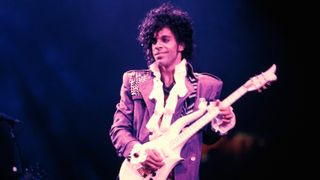In 2004, at the Rock & Roll Hall of Fame induction ceremony, Prince delivered a performance of “While My Guitar Gently Weeps” that has since become legendary. Joined on stage by music icons Tom Petty, Jeff Lynne, Steve Winwood, and Dhani Harrison, son of George Harrison, Prince unleashed a guitar solo that was not just musically breathtaking but also emotionally charged. Unbeknownst to many at the time, this performance was more than just a tribute; it was, according to reports, an act of deliberate and masterful revenge.
The backstory to this iconic moment reveals a fascinating layer of Prince’s personality and his unwavering self-belief. Just a year prior to this performance, Rolling Stone magazine published its list of the 100 Greatest Guitar Players Of All Time. To the surprise and perhaps indignation of Prince, his name was conspicuously absent. This omission, as a recent New York Times Magazine feature highlighted in an article about an upcoming Ezra Edelman Prince documentary, served as the spark for the explosive solo that would soon captivate the world.
 Prince, Tom Petty, Jeff Lynne, and Steve Winwood perform 'While My Guitar Gently Weeps' at the Rock and Roll Hall of Fame in a remastered 2021 video.
Prince, Tom Petty, Jeff Lynne, and Steve Winwood perform 'While My Guitar Gently Weeps' at the Rock and Roll Hall of Fame in a remastered 2021 video.
Questlove, in Edelman’s documentary, reportedly expresses his disbelief at Rolling Stone‘s snub, giving context to Prince’s powerful performance. What might have seemed like a display of pure musical genius was also fueled by a sense of being undervalued, a feeling Prince transformed into an unforgettable artistic statement. The New York Times Magazine piece describes the performance as “a supreme expression of Prince’s superiority and bravura,” further emphasizing the undercurrent of defiance and self-assertion.
Prince’s solo transcended mere technical skill; it was a profound emotional outpouring channeled through his guitar. Critics and fans alike lauded it as one of the greatest guitar solos ever played. The climax of the performance, where Prince launched his guitar into the air with a flourish before confidently exiting the stage, only solidified its legendary status. This wasn’t just a performance; it was a mic drop moment, a definitive statement delivered without uttering a single word.
The article in The New York Times Magazine further elaborates on the “revenge” narrative, stating, “Prince nursed these kinds of slights, and his commandeering of the stage – at an event associated with [founder] Jann Wenner and Rolling Stone – was, in part, an act of revenge.” The performance wasn’t just about proving his guitar prowess; it was a calculated move to reclaim his perceived due recognition on a very public stage, particularly one linked to the publication that had slighted him. The article astutely points out the complex emotions at play: “There’s spite and aggression in the performance. But there’s also pain – in his wincing face, his apartness: a small, soigné Black man onstage with these rumpled white rockers.” This nuanced observation adds depth to the interpretation of the solo, suggesting it was a multifaceted expression of frustration, pride, and artistic brilliance.
Tom Petty, one of the “rumpled white rockers” sharing the stage that night, recognized the historical significance of the moment as it unfolded. He later recounted to The New York Times in 2016, after Prince’s passing, “You see me nodding at him, to say, ‘Go on, go on.’ He just burned it up. You could feel the electricity of ‘something really big’s going down here.’” Petty’s words underscore the palpable energy and undeniable impact of Prince’s solo, confirming its immediate recognition as a landmark moment in rock history.
 Prince delivering a powerful guitar solo on stage, captured by Richard E. Aaron/Redferns, highlighting his dynamic performance style during the 'While My Guitar Gently Weeps' rendition.
Prince delivering a powerful guitar solo on stage, captured by Richard E. Aaron/Redferns, highlighting his dynamic performance style during the 'While My Guitar Gently Weeps' rendition.
Whether or not Rolling Stone consciously received Prince’s message of guitar virtuosity delivered through “While My Guitar Gently Weeps,” the magazine eventually revised its stance. In a later, expanded list of the 250 Greatest Guitarists, Prince was placed at number 14. While this acknowledgment came after the fact and amidst ongoing debates about the list’s composition – with some questioning inclusions and exclusions – it nonetheless marked a significant rise in Prince’s Rolling Stone ranking.
Though Ezra Edelman’s extensive nine-hour documentary about Prince faces potential roadblocks due to estate concerns, the legend of Prince’s “While My Guitar Gently Weeps” performance continues to grow. It remains a powerful testament to his musical genius, his complex personality, and his unparalleled ability to channel personal experiences into breathtaking art. This Rock & Roll Hall of Fame performance serves not only as a highlight in Prince’s illustrious career but also as a reminder of the potent force of music as a means of expression, defiance, and ultimately, revenge served piping hot on a stage of legends.
